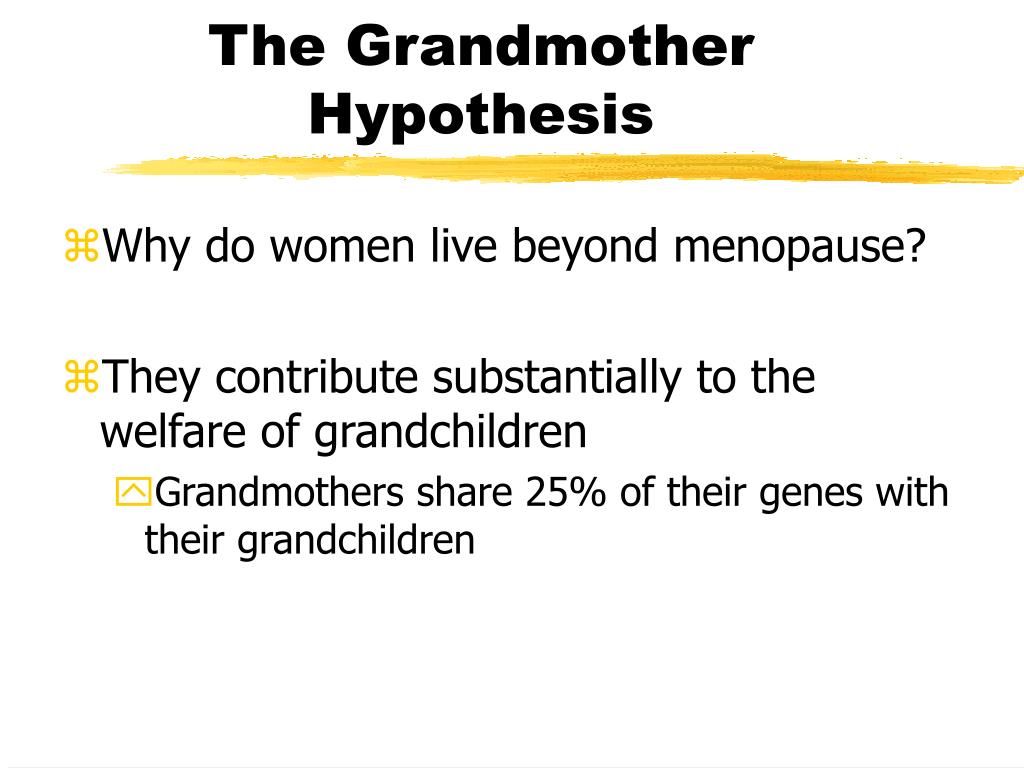The Grandmother Hypothesis: Why Women Live Longer and the Power of Menopause

We often think of evolution in terms of survival and reproduction—the strongest and most fertile pass on their genes. So, why would nature design a system where human women, along with killer whales and elephants, live for decades after they can no longer have children? If a woman's power is her ability to create life, why would evolution "turn her off" for the last quarter of her life?
This is one of the most fascinating puzzles in human evolution, and the answer, known as the Grandmother Hypothesis, reveals a truth more powerful than childbirth itself: the ultimate evolutionary advantage is wisdom.
The Biological ParadoxStatistically, males are the disposable sex. From a purely reproductive standpoint, you could repopulate the planet with many women and just one man. But if you flip it, one woman and a hundred men can only produce a limited number of offspring. A woman's fertility is a precious biological resource.
Yet, here are the facts:
- Women experience menopause, typically ceasing fertility in their late 40s or early 50s.
- Women have a longer life expectancy than men.
- This means a significant portion of a woman's life—often 25+ years—is lived after her direct reproductive capacity ends.
This seems to contradict the core principle of "survival of the fittest." What could be more "fit" than creating life? The answer is: ensuring that the lives already created not only survive, but thrive.
The Killer Whale Connection: Evidence in the WildThe Grandmother Hypothesis isn't just a human story. We see this same pattern in only two other species: killer whales and elephants. These are not coincidentally the planet's other big-brained, socially complex animals.
Research on killer whales provides stunning evidence. In the wild, female killer whales routinely live into their 80s, while males live to about 60. More crucially, we've learned that pods led by a post-reproductive grandmother have a significantly higher chance of survival. Why?
- They are libraries of survival. Older matriarchs remember the location of scarce food sources during lean years. They know the migration routes that avoid predators and find rich feeding grounds.
- They are educators. They pass this critical knowledge on to their children and, most importantly, their grandchildren, dramatically increasing the entire pod's survival odds.
This mirrors the human story perfectly. Childbirth is dangerous. Every pregnancy was a potential death sentence for our ancestors. By taking a woman "offline" from the risks of childbirth after a certain age, evolution protected a more valuable asset: her accumulated knowledge.
The Human Grandmother: The First TeacherFor most of human history, survival wasn't about being the strongest; it was about being the smartest. Which plant is poisonous? Where is the water source during a drought? How do you treat a fever? This was information earned through a lifetime of experience.
The grandmother, freed from the direct demands of infant care, played a pivotal role:
- She ensured her grandchildren survived. She could help forage, prepare food, and care for children, allowing her own children (especially daughters) to have more offspring sooner.
- She became the community's educator. She was the one who told the stories, taught the skills, and passed on the cultural and practical wisdom that allowed the next generation to adapt and overcome challenges.
- She protected the tribe's knowledge. Her very existence was a safeguard against the loss of critical information, making the entire community more resilient.
This is why evolution favored women who lived long past menopause. A grandmother's wisdom directly increased the survival chances of her genetic lineage, creating a powerful selective pressure for longevity in females.
What About Grandfathers?This is a natural question. Men do experience a mellowing later in life, often linked to a gradual decline in testosterone and an increase in oxytocin, which fosters bonding and caregiving. We did, in a sense, evolve "grandpas." However, the evolutionary pressure was stronger for women. Menopause is a hard biological stop, ensuring 25+ years of wisdom-sharing. The shift in males is more gradual and less absolute, which is why the longevity gap persists.
The Modern Implication: Honoring the Keepers of WisdomThe Grandmother Hypothesis forces us to radically rethink the value we assign to age and gender in our modern world. It argues that a society that dismisses its elders is cutting itself off from its own evolutionary lifeblood.
The message is clear: The most powerful thing a woman can do is not just create life, but to nurture, teach, and guide it. Her value does not diminish with age; it transforms into something even more critical for the survival and success of her family and community. The grandmother isn't a relic of the past; she is the embodiment of our collective memory and the key to our future resilience.
It's time we started listening.
Comments (Add)
Showing comments related to this blog.